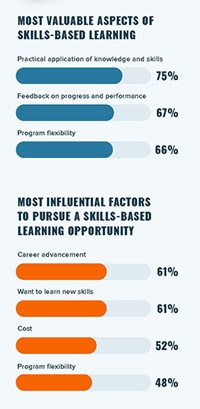Research Reveals Growing Demand to Connect Academic Learning to Careers
Skills-Based Learning, Certifications, Apprenticeships Top Priorities for Students, Global Survey Shows
- By Kristal Kuykendall
- 10/10/23
Skills-based learning in higher education and a clearer path to a career are the top priorities for students and educators this year, according to the 2023 State of Student Success and Engagement in Higher Education survey results released today by Instructure, the maker of Canvas LMS.
The study, conducted by Hanover Research for Instructure, surveyed more than 6,100 students, administrators, and faculty from two- and four-year academic institutions, both public and private, according to the report. Respondents were from institutions in 17 countries.
Identified by respondents as the two most important factors impacting student success and engagement were skills-based learning programs and certification and apprenticeship programs — both for their practical application in the workforce, according to the fourth annual survey report.
Top Trends Impacting Higher Ed Student Success
 1) Skills-based learning: “Students increasingly desire courses and programs that undoubtedly prepare them for the workforce, and (they) expect educators to make more personalized courses, offer hands-on, practical learning opportunities, and support on-the-go learners,” the report said.
1) Skills-based learning: “Students increasingly desire courses and programs that undoubtedly prepare them for the workforce, and (they) expect educators to make more personalized courses, offer hands-on, practical learning opportunities, and support on-the-go learners,” the report said.
2) Certificates and apprenticeship programs: Increasingly important to both students and employers, these programs allow students to demonstrably prove their learning relevant to workplace skills, and increase upskilling/reskilling opportunities for those already in their workforce. Instructure urges colleges and universities to "adapt their offerings to meet this need" and said that of the skills-based learning opportunities institutions currently offer, "students are most likely to consider certificates (54%) and apprenticeships (42%),” and together these programs were “viewed positively by three-quarters of respondents," the report said.
3) Embrace Generative AI: Institutions "need to provide consistent guidelines and training around generative AI for educators and students — or risk a growing divide in skill development," the report said. "Despite the building interest in generative AI, these tools have yet to be used consistently across institutions," with only one-quarter of educators surveyed reporting they use generative AI tools. The top concerns educators have about using AI in classrooms are cheating/plagiarism and decreased creativity/critical thinking among students – who also use AI for research, writing and test preparation. "Instead of hyper-focusing on cheating, educators should shift their focus to new assessment methods and productive uses of generative AI tools. Otherwise, they risk losing tech-native students and an opportunity to prepare them for future jobs that will leverage advanced technology," Instructure recommended.
-
27% of institutions surveyed have strict guidelines for using generative AI
-
39% have only “light guidelines” on generative AI use
-
31% of institutions offering no AI training options.
-
Institutions in Europe, Middle East, Africa, and Asia Pacific “are significantly more likely to use generative AI for classes, while those in North America are significantly more likely not to, although they know how,” the report noted.